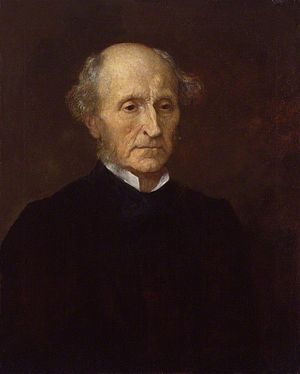Portal:Liberalism
Portal maintenance status: (June 2018)
|
Template:/box-header Liberalism is a political and moral philosophy based on the rights of the individual, liberty, consent of the governed, political equality, right to private property and equality before the law. Liberals espouse various and often mutually warring views depending on their understanding of these principles but generally support private property, market economies, individual rights (including civil rights and human rights), liberal democracy, secularism, rule of law, economic and political freedom, freedom of speech, freedom of the press, freedom of assembly, and freedom of religion. Liberalism is frequently cited as the dominant ideology of modern history.
Liberalism became a distinct movement in the Age of Enlightenment, gaining popularity among Western philosophers and economists. Liberalism sought to replace the norms of hereditary privilege, state religion, absolute monarchy, the divine right of kings and traditional conservatism with representative democracy, rule of law, and equality under the law. Liberals also ended mercantilist policies, royal monopolies, and other trade barriers, instead promoting free trade and marketization. Philosopher John Locke is often credited with founding liberalism as a distinct tradition based on the social contract, arguing that each man has a natural right to life, liberty and property, and governments must not violate these rights. While the British liberal tradition has emphasized expanding democracy, French liberalism has emphasized rejecting authoritarianism and is linked to nation-building. (Full article...)
The Demands of Liberal Education is a 1999 political philosophy book by Meira Levinson that establishes a liberal political theory of children's education that fits the mutual needs of the state and its diverse citizenry. She writes that the intent of a liberal education—an education that follows from a liberal society's values—is to maximize the autonomy of individual children through increasing their capacity for liberty. Levinson argues autonomy as a right to children. The book, published by Oxford University Press, aims to address a lacuna between educational policy and liberal political theory.
Levinson advocates for a weak perfectionist state that can promote thick autonomy while accepting citizens who do not agree. She argues for public schools "common" to all citizens and "detached" from individual citizen or community values, and argues for a constitutional mandate to this end. (Full article...)
John Stuart Mill (20 May 1806 – 7 May 1873) was an English philosopher, political economist, politician and civil servant. One of the most influential thinkers in the history of liberalism, he contributed widely to social theory, political theory, and political economy. Dubbed "the most influential English-speaking philosopher of the nineteenth century" by the Stanford Encyclopedia of Philosophy, he conceived of liberty as justifying the freedom of the individual in opposition to unlimited state and social control.
Mill was a proponent of utilitarianism, an ethical theory developed by his predecessor Jeremy Bentham. He contributed to the investigation of scientific methodology, though his knowledge of the topic was based on the writings of others, notably William Whewell, John Herschel, and Auguste Comte, and research carried out for Mill by Alexander Bain. He engaged in written debate with Whewell. (Full article...)
List of selected biographies
|
|---|
Template:/box-header The page "Portal:Liberalism/Selected quote/19" does not exist.
Template:/box-header Template:/Categories
Template:/box-header Template:/Related portals
Template:/box-header Template:/Projects
Template:/box-header Template:/Featured content
The following Wikimedia Foundation sister projects provide more on this subject:
-
Commons
Free media repository -
Wikibooks
Free textbooks and manuals -
Wikidata
Free knowledge base -
Wikinews
Free-content news -
Wikiquote
Collection of quotations -
Wikisource
Free-content library -
Wikiversity
Free learning tools -
Wiktionary
Dictionary and thesaurus




















